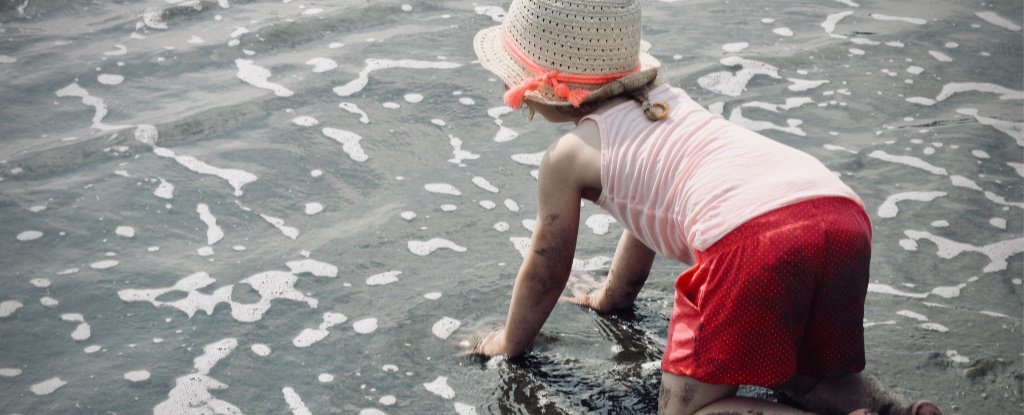早期感染似乎不能预防过敏——但在大自然中变脏或许可以
早期感染似乎不能预防过敏——但在大自然中变脏或许可以
Over the past few decades, allergies and asthma have become common childhood diseases, especially in developed countries. Almost 20 percent of Australians experience some kind of allergy, whether it's to food, pollen, dust, housemites, mould or animals.
在过去的几十年里,过敏和哮喘已经成为常见的儿童疾病,尤其是在发达国家。近20%的澳大利亚人对某些食物、花粉、灰尘、室友、霉菌或动物过敏。
When people suffer from food allergies, hay fever or asthma, their immune system incorrectly believes the trigger substances are harmful and mounts a defence.
当人们遭受食物过敏、花粉热或哮喘时,他们的免疫系统错误地认为触发物质是有害的,并进行防御。
The response can range from mild symptoms, such as sneezing and a blocked nose (in the case of hay fever), to anaphylaxis (from severe food allergies or bee stings) and asthma attacks.
过敏反应的范围从轻微的症状,如打喷嚏和鼻塞(花粉热),到过敏反应(严重的食物过敏或蜜蜂叮咬)和哮喘发作。
We used to think the rise in allergic conditions was because we weren't exposed to as many early infections as previous generations. But the science suggests that's not the case.
我们过去认为过敏症状的增加是因为我们没有像前几代人那样暴露在那么多的早期感染中。但科学表明事实并非如此。
However it seems being out in nature, and exposed to diverse (but not disease-causing) bacteria, fungi and other microorganisms may help protect against asthma and allergies.
然而,它似乎是在大自然中,并暴露在各种(但不是致病的)细菌、真菌和其他微生物可能有助于防止哮喘和过敏。

Remind me, what's the hygiene hypothesis?
提醒一下,什么是卫生假说?
In 1989, researcher David Strachan examined allergy patterns in more than 17,000 children in England. He noticed young siblings in large families were less likely to have hay fever than older siblings or children from small families.
1989年,研究人员David Strachan对英国17000多名儿童的过敏模式进行了研究。他注意到大家庭中的年轻兄弟姐妹比年长的兄弟姐妹或小家庭的孩子患花粉病的可能性更小。
He proposed that these younger siblings were exposed to more childhood illness at a younger age, as more bugs were circulating in these large families and the younger children were less likely to wash their hands and practise good hygiene.
他提出,这些年幼的兄弟姐妹在更小的时候接触到更多的儿童疾病,因为更多的病菌在这些大家庭中传播,而年幼的孩子不太可能洗手并养成良好的卫生习惯。
Greater exposure to these childhood infections helped "train" their immune systems not to overreact to harmless things like pollen.
更多地接触这些儿童感染,有助于“训练”他们的免疫系统不要对无害的东西如花粉过度反应。
Strachan coined the term "hygiene hypothesis" to explain this phenomenon, and the idea has been appealing to our dirty side ever since.
斯特拉坎创造了“卫生假说”这个术语来解释这一现象,从那以后,这个观点就一直吸引着我们肮脏的一面。
Strachan wasn't the first to notice exposure to "dirty environments" seemed to prevent allergic disease. A century earlier, in 1873, Charles Blackley noted hay fever was a disease of the "educated class", and rarely occurred in farmers or people living in less sanitary conditions.
斯特拉坎并不是第一个注意到“肮脏的环境”似乎可以预防过敏性疾病的人。一个世纪以前,也就是1873年,查尔斯·布莱克利指出,花粉热是“受过教育的阶层”的一种疾病,很少发生在农民或生活在卫生条件较差的人身上。
Ditching the hygiene hypothesis
抛弃卫生假设
However, Blackley and Strachan were wrong about one important thing: the association between sanitation and allergies is not due to reduced exposure to early childhood infections (or "pathogens").
然而,布莱克利和斯特拉坎在一件重要的事情上是错误的:环境卫生和过敏之间的联系并不是因为儿童早期感染(或“病原体”)的减少。
Large studies from Denmark, Finland, and the United Kingdom have found no association between the number of viral infections during childhood and allergic disease. In other words, exposure to disease-causing pathogens doesn't appear to prevent allergies.
来自丹麦、芬兰和英国的大型研究发现,儿童时期的病毒感染数量与过敏性疾病之间没有联系。换句话说,接触致病的病原体似乎并不能预防过敏。
In fact, exposure to childhood viral infections, in addition to making a child sick, may contribute to the development of asthma in predisposed children.
事实上,接触儿童病毒感染,除了使儿童生病外,可能有助于易感儿童哮喘的发展。
Many researchers now argue the term "hygiene hypothesis" is not only inaccurate but potentially dangerous, because it suggests avoiding infection is a bad thing. It's not.
许多研究人员现在认为,“卫生假说”这个术语不仅不准确,而且有潜在的危险,因为它表明避免感染是一件坏事。它不是。
Good hygiene practices, such as hand washing, are critical for reducing the spread of infectious and potentially deadly diseases such as influenza and the Wuhan coronavirus.
良好的卫生习惯,如洗手,对减少传染性和潜在致命疾病的传播至关重要,如流感和武汉冠状病毒。
What about 'good' exposure to bacteria?
“有益”的细菌接触会怎样呢?
For healthy immune function, we need exposure to a diverse range of bacteria, fungi and other bugs – known as microbes – in the environment that don't make us sick.
为了保持健康的免疫功能,我们需要接触环境中各种各样的细菌、真菌和其他微生物,这些微生物不会让我们生病。
Within urban environments, recent research shows people who live closer to green, biodiverse ecosystems tend to be healthier, with less high blood pressure and lower rates of diabetes and premature death, among other things.
最近的研究显示,在城市环境中,生活在更接近绿色、生物多样性更丰富的生态系统中的人往往更健康,高血压发病率更低,糖尿病和过早死亡的几率也更低。
More specifically, research has found growing up on a farm or near forests, with exposure to more biodiverse ecosystems, reduces the likelihood of developing asthma and other allergies.
更具体地说,研究发现,在农场或森林附近长大,接触更多生物多样性的生态系统,可以降低患哮喘和其他过敏症的可能性。
This is potentially because exposure to a diversity of organisms, with a lower proportion of human pathogens, has "trained" the immune system not to overreact to harmless proteins in pollen, peanuts and other allergy triggers.
这可能是因为,接触到多样性的有机体,以及比例较低的人类病原体,“训练”了免疫系统,使其不会对花粉、花生和其他引发过敏的无害蛋白质产生过度反应。
How can we get more 'good' exposure?
我们怎样才能获得更多的“好”曝光率?
We can try to expose children to environments more like the ones in which humans, and our immune systems, evolved.我们可以让孩子们接触到更像是人类和我们的免疫系统进化的环境。
Most obviously, children need to have exposure to green space. Playing outdoors, having a garden, or living near green space (especially near a diverse range of native flowering plants) is likely to expose them to more diverse microbes and provide greater protection from allergic diseases.
最明显的是,孩子们需要接触绿色空间。在户外玩耍,拥有一个花园,或者住在绿地附近(尤其是在多种多样的本地开花植物附近),都有可能使他们接触到更多的微生物,从而更好地保护他们免受过敏性疾病的侵害。
Infants who are breastfed tend to have more diverse gut microbiomes (a larger variety of bacteria, fungi and other microscopic organisms that live in the gut), which makes them less likely to develop allergic diseases in childhood.
母乳喂养的婴儿肠道微生物群更多样化(肠道内的细菌、真菌和其他微生物种类更多),这使得他们在童年时期更不容易患上过敏性疾病。
Having a varied diet that includes fresh and fermented foods can help cultivate a healthy gut microbiome and reduce allergic disease. As can using antibiotics only when necessary, as they kill off good bacteria as well as the bad.
饮食多样化,包括新鲜和发酵食品,可以帮助培养健康的肠道微生物群,减少过敏疾病。只有在必要的时候才可以使用抗生素,因为它们会杀死有益菌和有害菌。
So keep washing your hands, especially in cities and airports, but don't be afraid of getting a little dirty in biodiverse environments.
所以要勤洗手,尤其是在城市和机场,但不要害怕在生物多样性的环境中会变得有点脏。
- 频道推荐
- |
- 全站推荐
- 推荐下载
- 网站推荐


















